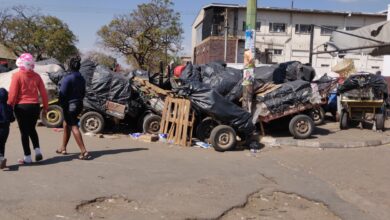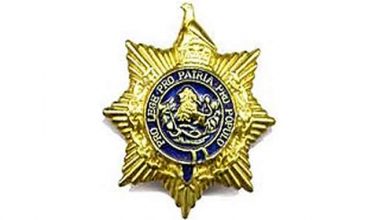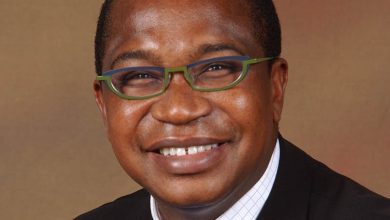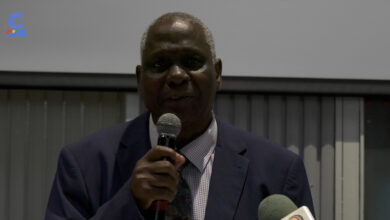Hundreds bid farewell to Chief Vezi Maduna
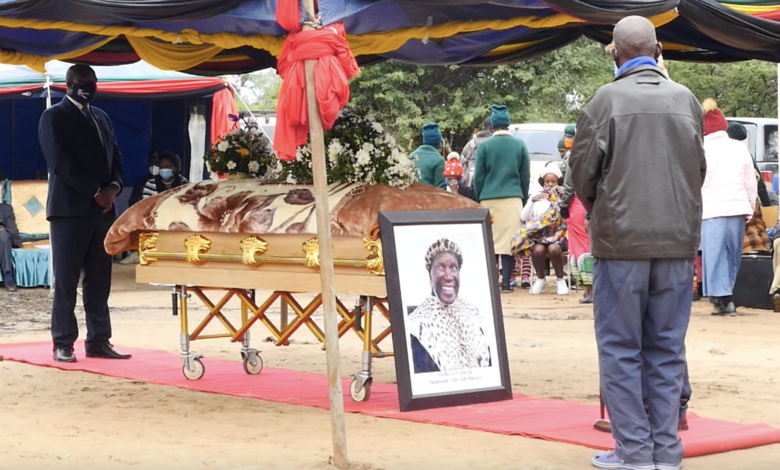
Truthful, brave and dignified!
This was the consensus from mourners on the character and life of Filabusi Paramount Chief, Vezi Maduna Mafu (86) who was buried at his homestead in Avoca, Filabusi on Wednesday.
His funeral was attended by hundreds who said despite the Covid-19 restrictions in place they had to bid farewell to their long serving traditional leader.
Chief Maduna was installed substantive chief on August 27, 1974, a post he held until his death last Saturday after suffering from a stroke in 2019.
Although the chief’s burial was state-assisted as said by the Chief mourner, Minister of Local Government, July Moyo, who overlooks the traditional leadership institution, there were murmurs of disapproval from mourners that government had not publicly or officially declared him a national hero considering the role he played in fighting colonial oppression and push for local empowerment.
Chief Maduna earned years in detention while the torture he endured from the colonial regime affected his wellbeing in his formative years
President of the Chiefs Council, Chief Fortune Charumbira revealed the Maduna family had received US$6 500 from the government for the burial exoenses.
He said when chiefs died, the state gave the bereaved family US$1 500, with USS$500 used to purchase a coffin while the remainder was divided for other expenses.
“In addition to this US$1 500, the Mafu family was given $5 000,” Chief Charumbira said, adding Chief Maduna was one of the chiefs who led the charge for them to receive benefits.
“In 2004 we received our first Mazda vehicles now we drive Isuzus. Whenever there was a pressing matter in government meetings I would ask Chief Maduna to speak and when he did, he would not just demand but will act as a father figure, lecture and teach, which he did during Mugabe’s reign.”
The Local Government minister in his address said this was the first time in history to bury an exceptional man.
“It is rare to bury a chief, father, traditional leader, ex-detainee and a state recognised leader at the same time. His death will be a hammer blow to the country and the traditional leadership would be poorer without him,” Moyo said.
Moyo said it was important to narrate the activities that Chief Maduna undertook to liberate the country.
“He didn’t take the settler regime lying low. In 1960 he joined the National Democratic Party and was arrested in 1961 for active participation in politics. He was charged under the Law and Order Maintenance Act at the Filabusi Magistrate Court. That same year he joined ZAPU and I know how close he was to Nkomo. In 1971, he was arrested with Vote Moyo, Norman Mabhena and were detained at Gwanda Prison.
“In 1976, Chief Maduna rejected the colonial rule, was arrested and detained at Gwanda Prison then was moved to Colleen Bawn then to Hwahwa Camp Number Four. He was detained with the likes of Elliot Maphenduka, Welshman Mabhena, Esau Moyo …at Shabani, Rose Camp and Khami prisons until 1980,” said the minister.
The chief mourner hailed Chief Maduna as an “illustrious son of the soil, who did not use his position to gain favour from oppressors but fought to liberate people.”
“He will be sadly missed when guns were surrendered in 1980 he embarked on another warfare that of development and to emancipate rural communities. I want to tell you he was a total chief, a total leader, a total hero and he could perform so many functions from village level upto national level,” Moyo said.
Moyo added Maduna was a friend to the presidium and to the defence forces, adding that “for those who will study history, they will know of the deep friendship between him and the president as after the succession of King Lobengula, the president’s forefathers were there.”
The minister’s claims elicited chants of disapproval from the mourners who questioned the varacity of the claims.
Moyo also said Chief Maduna had established the Godlwayo Cultural Centre, an irrigation scheme, Avoca Health Centre, Avoca Secondary School and wanted the West Nicholson road to Mberengwa to be tarred.
“We will honour his wish to tar that road. Since the roads are in a bad state of roads, I spoke to the minister of transport and secretary of transport to bring a grader here so people know we’ve not forgotten them and this work will continue,” he said.
Roads leading to Chief Maduna’s homestead were in bad shape and mourners were advised to either use the longer but better route which was the Gwanda – West Nicholson – Avoca route or the Silalatshani – Avoca route that most opted to use but had to manoeuvre due to the rains.
The minister himself was collected by a helicopter after his address, as it was mentioned he had to travel to Chimanimani.
Before leaving, the local government minister seemed to give a nod of approval to Chief Maduna’s son Dambisa Mafu – supposed heir to take over the chieftainship.
“We have buried a hero and lost a liberation hero but inherited a revolutionary in the name of his son,” he said.
Mafu also praised his father for being a truthful man.
“If you speak the truth, truth will liberate you,” he said, and in his speech also urged people “to bury the past for the country to look forward.”
“We are still held by the past and clinging to the past. We must also shun tribalism.”
Mafu’s sentiments prompted some to accuse him of deviating from his father’s stance who wanted an urgent resolution of Gukurahundi genocide.
Deputy President of the Chiefs Council, Chief Mtshana Khumalo, Chief Masendu, Chief Nyangazonke, Chief Mathema, Chief Mphini, Chief Jahana, Chief Gwesela, Chief Sitaudze, Chief Sibasa attended the burial including service chiefs and cultural enthusiasts.


